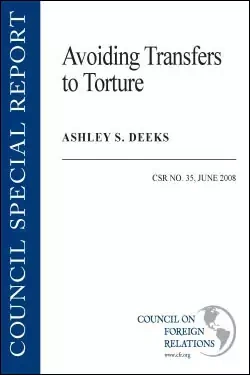
Avoiding Transfers to Torture

- Council Special Report
- Concise policy briefs that provide timely responses to developing crises or contributions to current policy dilemmas.
Overview
A number of U.S. counterterrorism practices have generated significant controversy in recent years.
One area in which the United States faces particular criticism is the treatment of terrorist suspects, both those it holds itself and those it sends to other countries. While this criticism generally does not directly constrain U.S. practices, its effects should not be dismissed. In the struggle to prevent terrorist attacks and, especially, to frustrate terrorist recruitment, the perceived legitimacy of U.S. actions can be as important as the actions themselves.
More on:
When the United States wishes to transfer a suspect to a country where it believes the likelihood of torture is high, it can seek diplomatic assurances of humane treatment from the receiving country. In Avoiding Transfers to Torture, Ashley S. Deeks analyzes the debate over U.S. use of assurances against torture. The report explains the contexts in which assurances are used, how assurances can be conveyed, and what they can contain. It then outlines the objections of critics, who argue that assurances are of little or no help in preventing mistreatment in that they come from unreliable states and compliance cannot be legally enforced or easily monitored, especially since the United States often keeps the assurances secret.
The report argues that despite problems associated with their use, assurances are an important tool for dealing with dangerous suspects. Prosecution is often impossible, and the alternatives—holding suspects indefinitely, releasing them in the United States, or sending them to other countries with no assurances—are often unpalatable or unacceptable. Deeks therefore recommends a number of ways to respond to criticism so that the United States can continue using assurances. In addition, she proposes working with U.S. allies (who also use them) to increase corrections assistance to countries that receive suspects, something that could over time diminish the incidence of mistreatment and thus the need for assurances.
Avoiding Transfers to Torture is an intellectually rigorous and honest assessment of both the utility of assurances and their shortcomings. It illustrates the age-old point that it is not enough to criticize; one must also propose solutions. Recognizing the stakes for U.S. security, the rights of terrorist suspects, and America’s reputation around the world, Deeks crafts a thoughtful report that is critical of some U.S. practices but equally demanding of potential reforms. The result is a genuine contribution on an important issue that is all too often debated as if there were easy options when in reality there are none.
More on:
 Online Store
Online Store